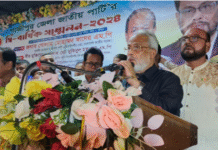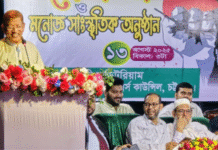
The Election Commission on Sunday unveiled the booklet of action plan for the next general elections with the ruling Awami League welcoming it and the Bangladesh Nationalist Party saying it would not solve the political crisis without the outline of poll-time government.
Chief election commissioner KM Nurul Huda unveiled the action plan for holding the next parliamentary elections between October 30, 2018 and January 28, 2019 at Election Training Institute Bhaban in Dhaka.
In his instant reaction, Awami League advisory council member Tofail Ahmed termed the action plan pragmatic.
‘Accepting the roadmap all the political parties should prepare for the elections,’ Tofail, also the commerce minister, told reporters at the ministry.
Awami League presidium member Mohammad Abdur Razzaque told New Age that the party welcomed the action plan and expected the commission to implement it properly.
At a press conference at BNP’s Nayapaltan central office, BNP secretary general Mirza Fakhrul Islam Alamgir said that the action plan would not help resolve the crisis over the election-time government.
‘An election-time supportive government is a must for holding a neutral and fair election, and a dialogue on the matter is also very crucial right now. So, the crisis won’t be over with the action plan,’ he said.
The chief election commissioner, however, said that the format of the election-time government depended on the government’s political decision.
He also said that the commission did not have any scope to ensure a level playing field for all parties before announcing the schedule for general elections.
He said that it was not the commission but the government to decide which parties could hold meetings and processions in the streets or not. ‘We are now thinking only about election and how the election can be made credible,’ said Nurul Huda.
Razzaque said that ensuring a level playing field was the prime duty of the commission and the political parties would cooperate with it.
Fakhrul said that the commission announced the action plan which was not the main issue.
‘This is not the main crisis, the main crisis is how the next election would be held, what would the position of the government during election and what would be the role of the commission,’ he added.
Earlier on July 9, the commission finalised the action plan incorporating seven agendas – examination and reform of the electoral laws, collection of suggestions on easing and updating electoral process, delimitation of the constituencies, preparation the distribution of a flawless electoral roll, installation of polling stations following rules, registration of new political parties and audit of the registered parties and capacity building for all concerned for holding fair elections.
As per the action plan, the commission will start dialogue with political parties and other stakeholders from July 31.
The dialogue will begin with talks with civil society members. Dialogues with journalists will be held in August, while with 40 registered political parties from August to September.
Besides, the commission will sit for dialogues with election observers, women leaders and election management experts in October.
According to the action plan, the commission will complete delimitation of 300 parliamentary constituencies by December.
Election commissioners Mahbub Talukdar, Md Rafiqul Islam, Kabita Khanam and Shahadat Hossain Chowdhury and commission secretary M Abdullah, among others, were also present in the programme.
Source: New Age









